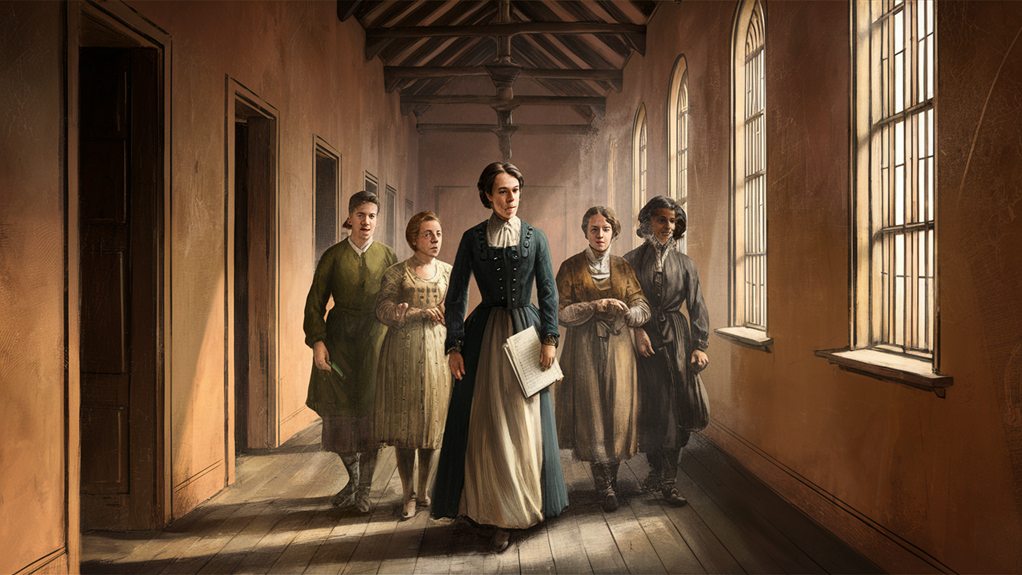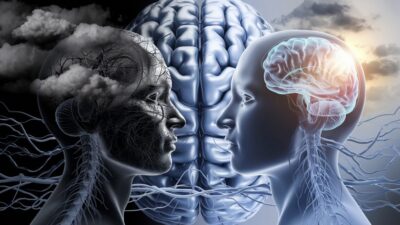Mental health treatment has undergone remarkable changes throughout history, and you'll be fascinated by its evolution. Ancient civilizations believed mental illness came from evil spirits or angry gods, often using skull drilling and rituals as treatments. By the 18th century, asylums emerged but provided harsh, inhumane care through methods like cold baths and restraints. The late 1800s brought Freud's psychoanalysis, shifting focus to therapeutic conversations instead of physical treatments. Thanks to reformers like Dorothea Dix, mental health care transformed into today's thorough approach, combining medication, therapy, and personalized treatment plans. There's much more to discover about this fascinating journey of understanding and treating mental illness.
Ancient Mental Health Beliefs

Examining ancient civilizations reveals dramatically different perspectives on mental health compared to modern understanding. If you'd traveled back in time, you'd find that many ancient cultures believed mental illness was caused by evil spirits, curses, or angry gods. Throughout the history of mental health, people used treatments like drilling holes in the skull or performing rituals to chase away demons.
In ancient Egypt, you would've seen priests treating mental illnesses in temples, while in ancient Greece, you'd find physicians like Hippocrates studying the brain's connection to behavior. The mental health history in Rome shows that they built special facilities for the mentally ill, though their treatments were often harsh.
As you explore psychiatry history, you'll discover that ancient Chinese medicine viewed mental health as an imbalance between yin and yang, treating patients with acupuncture and herbs.
These early beliefs about mental illness shaped how societies treated those with mental health conditions for thousands of years, and you can still see their influence in some cultures today, even though we now understand mental health through scientific and medical perspectives.
The Rise of Asylums
The dark era of asylums began in the late 18th century, when European and American societies started confining mentally ill people in large institutions.
You'll find that these facilities, while considered progressive for their time, often provided harsh and inhumane treatment to their patients. In what's now viewed as a controversial evolution of mental health treatment, doctors believed isolation and restraint would "cure" mental illness.
If you'd visited these asylums, you'd have witnessed overcrowded conditions where patients were often chained to walls or confined to small cells.
The methods used included cold water baths, spinning chairs, and other practices we now recognize as cruel.
These institutions marked significant mental health milestones, though not always positive ones. You might be surprised to learn that some asylums housed thousands of patients with very few staff members.
Early Medical Treatments

Inside these asylums, medical treatments emerged that reflected the limited understanding of mental illness during the 19th century.
You'll find that doctors often used treatments that, by today's standards, would seem quite shocking and misguided. They'd try everything from ice-cold baths to spinning chairs, believing these methods would "reset" the patient's brain.
If you'd visited an asylum in the 1800s, you'd have seen some common treatments being used regularly.
Bloodletting, where doctors drained blood from patients, was popular because they thought mental illness came from having too much blood in the brain.
You'd also have witnessed the use of purgatives, strong medicines that made patients violently ill, as doctors believed this would cleanse the body of "harmful humors."
Psychoanalysis and Therapeutic Approaches
During the late 1800s, up through the early 20th century, mental health treatment underwent a revolutionary shift with Sigmund Freud's introduction of psychoanalysis. Freud's theories offered a new comprehension of mental illness, suggesting that unresolved conflicts and repressed emotions could lead to symptoms of depression and anxiety, as noted in comprehending depression.
You'll find that Freud's methods were radically different from earlier treatments, as he believed in talking through problems and analyzing dreams to grasp the unconscious mind.
If you'd lived during this time, you'd have seen how psychoanalysis changed the way doctors approached mental health, moving away from physical treatments toward therapeutic conversations. You would've learned about Freud's famous couch, where patients would lie down and freely share their thoughts, feelings, and memories. This process, called "free association," helped patients uncover hidden trauma and repressed emotions.
As you explore this era, you'll discover that Freud's ideas sparked the development of many modern therapeutic approaches. While you mightn't agree with all of Freud's theories today, his work laid the foundation for talk therapy, cognitive behavioral therapy, and other psychological treatments you're familiar with now.
His emphasis on the importance of childhood experiences and unconscious thoughts continues to influence how we grasp mental health.
Mental Health Reform Movement

Pioneering reformers in the mid-1800s transformed mental health care through a series of groundbreaking changes in hospitals and asylums. You'll find that advocates like Dorothea Dix and Philippe Pinel fought tirelessly to improve conditions, believing that patients deserved dignity and humane treatment rather than chains and isolation.
During this period, you'd have witnessed a dramatic shift from punishment to rehabilitation, as reformers introduced "moral treatment," which emphasized kindness, routine activities, and therapeutic environments. They also recognized the potential of combining various therapeutic approaches to address individual needs, similar to the principles of integrative therapy that we see today.
They pushed for spacious facilities with gardens, proper ventilation, and clean living spaces, replacing the dark, cramped cells that were once common.
You might be surprised to learn that these reformers also challenged society's views on mental illness. They showed that many patients could improve with proper care, leading to the creation of state-funded hospitals and training programs for staff.
Even today, you can see their influence in modern psychiatric facilities, where treatment focuses on recovery and respect. Their work laid the foundation for many practices we still use, including occupational therapy and structured daily activities.
Modern Psychiatric Care Evolution
Modern psychiatric care frequently reflects a complex blend of biological, psychological, and social approaches that emerged in the late 20th century. As part of this evolution, the development of medications such as SSRIs and SNRIs has provided effective options for managing symptoms of depression and anxiety.
You'll find that today's mental health treatment options are vastly different from the institutional care of the past, with professionals now focusing on personalized treatment plans that work for each individual patient.
When you look at modern psychiatric facilities, you'll notice they're designed to be welcoming and therapeutic, rather than intimidating. You can expect to find a range of treatment options, including medication management, various forms of psychotherapy, and innovative approaches like cognitive behavioral therapy.
If you're receiving care today, you'll likely work with a team of professionals, including psychiatrists, psychologists, and social workers, who'll collaborate to address your specific needs.
Technology's also transformed how you can access mental health care, with options like teletherapy making treatment more accessible than ever.
You'll find that modern psychiatric care emphasizes recovery and rehabilitation, helping you maintain your independence while managing your mental health effectively.



